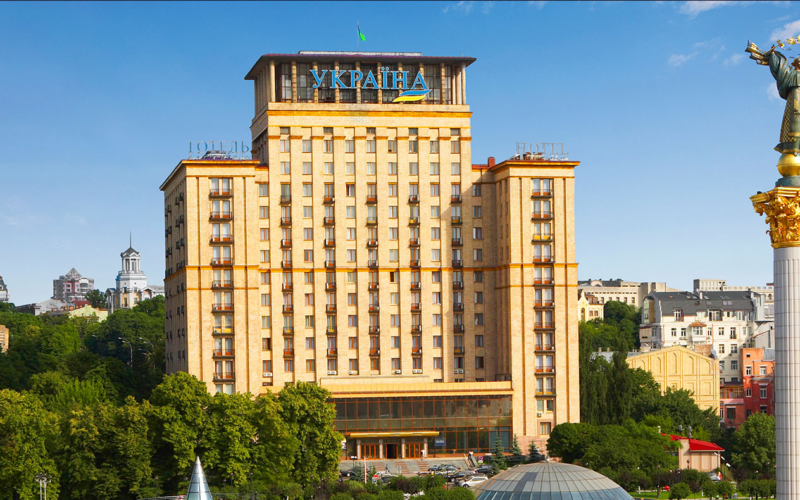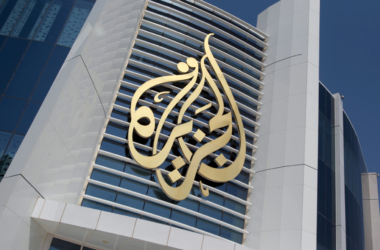Facing a relentless conflict and a strained economy, Ukraine has unveiled plans to privatize a range of state-owned companies to fund its war effort and stabilize its finances. The government aims to auction off some 20 state assets, including the historic Hotel Ukraine in Kyiv, in a bid to raise funds for the military and attract investment to revitalize the economy.
Historical Landmark and Economic Lifeline
The iconic Hotel Ukraine, which stands over Independence Square and has borne witness to significant events in the nation’s history, is among the assets slated for sale. Once a backdrop for celebrations and uprisings, it now represents a crucial part of Ukraine’s strategy to finance its ongoing conflict with Russia. The starting auction price for the hotel is set at $25 million.
This summer’s auctions will include diverse properties: from a large shopping mall in Kyiv to several mining and chemical companies. The privatization initiative seeks to address a $5 billion shortfall in the state budget designated for military spending. By drawing in investments, officials hope to create jobs, increase tax revenue, and foster economic self-sufficiency.
Addressing Fiscal Challenges
“The budget is in the red,” Oleksiy Sobolev, Ukraine’s deputy economy minister, acknowledged. “We need alternative funding to stabilize the macroeconomic situation, support the army, and achieve victory against Russia.”
Despite the urgency, the privatization faces significant hurdles. Ukraine’s ongoing conflict and deep-rooted corruption pose risks to the sale process. Experts warn that wartime conditions might lead to assets being sold at undervalued prices compared to their actual worth.
Investor Caution and Government Assurance
Ievgen Baranov, managing director at Dragon Capital, emphasized the need for the government to act responsibly, providing guarantees to prospective buyers. To temper investor concerns, the government aims for a conservative goal of raising a minimum of $100 million from asset sales this year—a modest figure compared to the extensive military aid from Western allies.
However, past privatization efforts in Ukraine have often faltered, marred by delays, legal disputes, and sales to oligarchs at reduced prices. Officials assure that a transparent auction system will prevent such issues, though challenges remain, particularly in resolving existing debt disputes.
Major Assets on the Auction Block
Among the prominent assets for sale is United Mining and Chemical Company (U.M.C.C.), a leading titanium producer. Previous attempts to auction U.M.C.C. failed due to a lack of bidders amid the pandemic and looming conflict. A fourth auction, scheduled for the fall, has drawn interest from seven investors, with a starting bid of around $100 million.
The privatization strategy, while risky, is seen as essential for Ukraine’s immediate and long-term stability. Michael Lukashenko, a partner at Aequo law firm, cautioned that delaying sales could lead to the destruction or the loss of assets to Russia.
Balancing Historical Significance and Economic Necessity
Kyiv residents express mixed feelings about privatizing historical sites like Hotel Ukraine. Some argue that every contribution to the war effort counts, while others fear the potential for corruption. Olha Kalinichenko, a patron of the hotel, recalls its significance during the Maidan revolution and stresses the need for transparency in handling the proceeds from such sales.
Vitaliy Koval, head of Ukraine’s State Property Fund, noted the financial burden of maintaining state-owned companies, with the least profitable ones costing the state over $50 million last year. His goal is to trim down the state’s holdings to 100 companies, focusing on privatizing those that are unsustainable under current conditions.
Attracting Foreign Investment Amid Conflict
The government is actively seeking foreign investors, using conferences like the one in Berlin to advertise the privatization opportunities. They argue that even amidst conflict, investment in Ukraine can yield benefits and demonstrate resilience. However, the destruction of assets like the power plant operated by Centrenergo, targeted by Russian missiles, illustrates the precarious environment investors face.
In conclusion, Ukraine’s move to sell state assets is a strategic effort to secure funding for its war and bolster its economy. The initiative underscores the dual challenges of financing a military campaign while navigating a fraught economic landscape, aiming to transform wartime adversity into opportunities for future growth.








